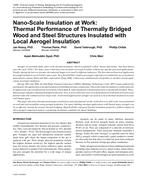
Nano-Scale Insulation at Work: Thermal Performance of Thermally Bridged Wood and Steel Structures Insulated with Local Aerogel Insulation
- Comments Off on Nano-Scale Insulation at Work: Thermal Performance of Thermally Bridged Wood and Steel Structures Insulated with Local Aerogel Insulation
- ASHRAE
Aerogel, an extremely light, nano-scale thermal insulation, which is popularly called “frozen and smoke,†has been known since the early 1930’s. For many years it had been only an object of research studies without any specific practical applications. Finally, during the last two decades this material began to be used by different industries. The best-known historical application of aerogel insulation was in NASA’s space suits. Now, flexible fiber-reinforced aerogel composites are studied for use as insulation materials for a future Moon and Mars exploration [Tang 2006]. Underwater insulation for oil pipelines is another current application of aerogel insulation.
During 2005 and 2006, the Oak Ridge National Laboratory (ORNL) Buildings Technology Center (BTC) team analyzed the potential for the application of aerogel insulation in building envelope components. Due to the relatively high price of this material, its application was considered only in locations where high-R-value insulation is needed and can be economically justified. Threedimensional computer simulations helped in this task. Next, a series of hot-box tests were performed on residential steel and woodframed walls and commercial low-slope roofs. In all tested applications aerogel was used as a local thermal insulation in areas with limited space.
This paper discusses thermal performance predictions and experimental results of the first-ever, full-scale, tests performed on wall and roof assemblies using aerogel insulation. For many building envelope applications with limited space aerogels can be an effective remedy for intense thermal bridging. High flexibility and good thermal insulation properties of fiber-reinforced silica aerogel composites make it a promising insulation candidate for future buildings.
Presented at Thermal Performance of Exterior Envelopes of Whole Buildings X – December 2007
Units: Dual
Citation: Thermal Performance of Exterior Envelopes of Whole Buildings X
Product Details
- Published:
- 2008
- Number of Pages:
- 6
- File Size:
- 1 file , 5.3 MB
- Product Code(s):
- D-BldgsX79

